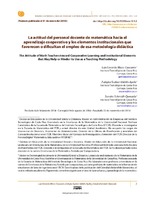Mostrar el registro sencillo del ítem
La actitud del personal docente de matemática hacia el aprendizaje cooperativo y los elementos institucionales que favorecen o dificultan el empleo de esa metodología didáctica.
| dc.contributor.author | Meza-Cascante, Luis Gerardo | |
| dc.contributor.author | Suárez-Valdés-Ayala, Zuleyka | |
| dc.contributor.author | Schmidt-Quesada, Sandra | |
| dc.date.accessioned | 2018-03-21T17:30:21Z | |
| dc.date.available | 2018-03-21T17:30:21Z | |
| dc.date.issued | 2014 | |
| dc.identifier | https://www.revistas.una.ac.cr/index.php/EDUCARE/article/view/6355 | es |
| dc.identifier.citation | Meza-Cascante, L., Suárez-Valdés, Z., & Schmidt-Quesada, S. (2014). La actitud del personal docente de matemática hacia el aprendizaje cooperativo y los elementos institucionales que favorecen o dificultan el empleo de esa metodología didáctica. Revista Electrónica Educare, 19(1), 3-24. | es |
| dc.identifier.issn | 1409-4258 | |
| dc.identifier.uri | https://hdl.handle.net/2238/9661 | |
| dc.description | Artículo científico | es |
| dc.description.abstract | This paper presents the results of research conducted in high schools in the central region of the Cartago province, Costa Rica. The goal of the research was to determine the attitude of high school math teachers toward cooperative learning in math and identify factors in secondary education institutions that can help or hinder the implementation of cooperative learning as a strategy for teaching mathematics. The research was conducted with 39 secondary education math teachers, who participated in a workshop on cooperative learning in mathematics. The attitude toward this methodology was measured by using semantic differential. This information was triangulated with data obtained from non-participant observation. A combination of in-depth interviews and non-participant observation was used to access data that identifies institutional factors helping or hindering the implementation of math cooperative learning. Findings suggest a positive attitude from teachers toward integrating cooperative work as a teaching strategy to promote math learning and toward the role played by school principals in the adoption of educational innovations. It also reveals that high schools have adequate material conditions to implement the methodology, although the need for training is considered. This finding should be taken into account by the proponents of this methodological option. | es |
| dc.language.iso | spa | es |
| dc.publisher | Revista Electrónica Educare | es |
| dc.relation.hasversion | doi: https://dx.doi.org/10.15359/ree.19-1.1 | es |
| dc.rights | acceso abierto | es |
| dc.rights.uri | https://creativecommons.org/licenses/by-nc-sa/4.0/ | * |
| dc.source | Revista Electrónica Educare | es |
| dc.subject | Aprendizaje | es |
| dc.subject | Docentes | es |
| dc.subject | Enseñanza | es |
| dc.subject | Metodología | es |
| dc.subject | Trabajo en equipo | es |
| dc.subject | Innovaciones | es |
| dc.subject | Research Subject Categories::SOCIAL SCIENCES::Social sciences::Education::Subject didactics | es |
| dc.title | La actitud del personal docente de matemática hacia el aprendizaje cooperativo y los elementos institucionales que favorecen o dificultan el empleo de esa metodología didáctica. | es |
| dc.title.alternative | The Attitude of Math Teachers toward Cooperative Learning and Institutional Elements that May Help or Hinder its Use as a Teaching Methodology | es |
| dc.type | artículo original | es |
Ficheros en el ítem
Este ítem aparece en la(s) siguiente(s) colección(ones)
-
Artículos [3]



